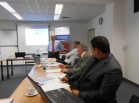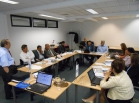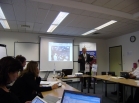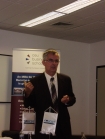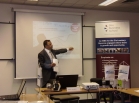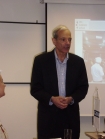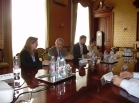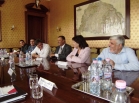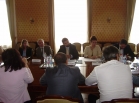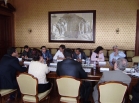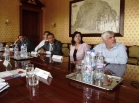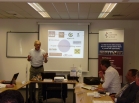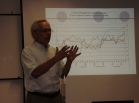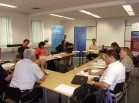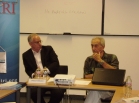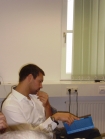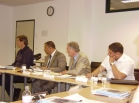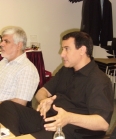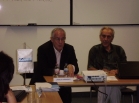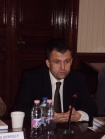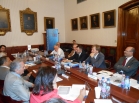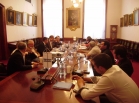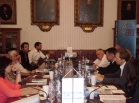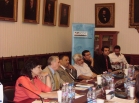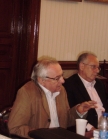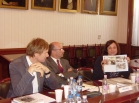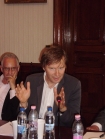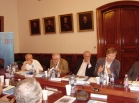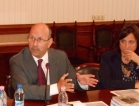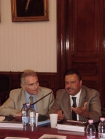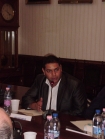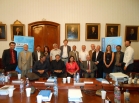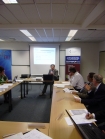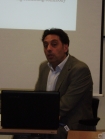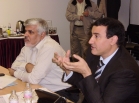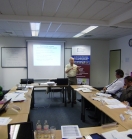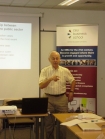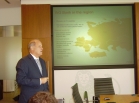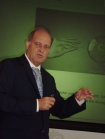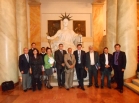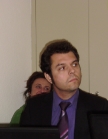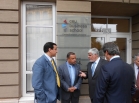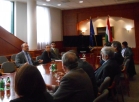The ICDT organized a study trip for leading Tunisian politicians with the support of the International Republican Institute (IRI), in cooperation with the Central European University (CEU). The project took place in Budapest between 9-15 September 2012.
During their one week long visit to Hungary, the delegates of the Tunisian political parties took part in academic sessions every morning, while in the afternoon they met key figures of the Hungarian democratic transition, including representatives of the economic sector and non-governmental organizations.
Throughout the implementation of the project, the ICDT aimed to equally implicate the fields of sharing the experiences of the Hungarian democratic transition, introducing the country itself and strengthening bilateral relations. The agenda of the study trip was thus set along these aspects.
On the first day, the participants gained insight to the Hungarian economic issues, the relation between monetary and fiscal policy, and also to the current state of the economy, through the contribution of a high rank government official, Dr. Balázs Hidvéghi, Deputy State Secretary, of the Ministry for National Economy.
The most relevant field for the ICDT is the assessment of the process of political-social transition, therefore, – considering the fact that Tunisia is currently going through a similar process – an important element of the program was showing the Tunisian delegation a unique part of the Hungarian democratic transition, namely the roundtable negotiations of the opposition parties. Organized at the Faculty of Law of the Eötvös Loránd University (ELTE) – which is related to the Hungarian transition in various ways –, presentations were held by members of the parties involved in the events of 1989, including founder of Fidesz Gábor Fodor, founder of SZDSZ Péter Hack, founder of MDF András Gergely, and László Kovács, member of MSZMP/MSZP. Based on the evaluations of the Tunisian participants, the discussion with the major players of the Hungarian transition, those who were closely and deeply involved in the process, was regarded as a highly useful element of the program. A member of the Tunisian Constitutional Assembly stressed that he would submit some of the issues mentioned at the session to a committee of the Assembly.
It was also a priority to provide the opportunity to non-governmental organizations to be represented at the study trip and share their experiences. Associates of the ING Bank Hungary from the private sector, the Clean Air Action Group, the Hungarian Civil Liberties Union, and the Athena Institute from the civil sector held discussions with the members of the Tunisian political parties about the manifestations of extremism in the society, the presence and the participation of the civil sector, and the system of tendering operations.
One of the highlights of the program was a meeting with Zsolt Németh, Minister of State at the Ministry of Foreign Affairs. Mr. Németh emphasized the strategic importance for Hungary of the North-African region and of Tunisia in particular, and also talked about the experiences and the regional implications of the Hungarian democratic transition, and informed the delegation about the priorities of the Hungarian foreign and external economic policy. A number of issues to be elaborated were raised at the discussion, which could further strengthen the ties between Tunisia and Hungary, such as mutual scholarship programs.
The project of the ICDT was evaluated as highly successful and useful by the Tunisian participants. They also highlighted the importance of the future cooperation between the two countries. As a strategic partner in the Hungarian foreign policy strategy, the ICDT is looking forward to taking part in this process.


